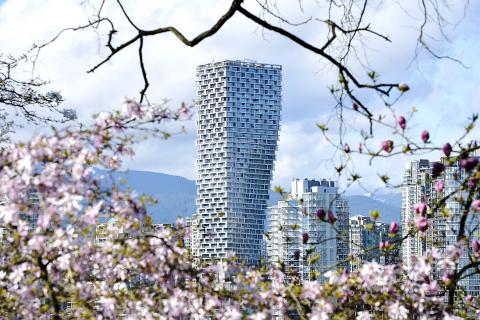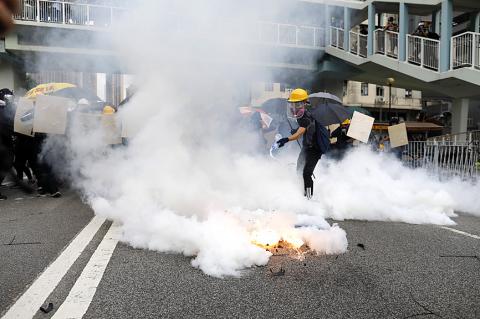As protests continue to rock Hong Kong, real-estate brokers in Canada and the UK are fielding a flood of inquiries from investors in the former British colony who are eager to get out.
Dan Scarrow, president of Macdonald Real Estate Group in Vancouver, said that many of his Chinese agents saw an uptick in interest for both sales and rentals this month from Hong Kong. One of his agents is putting off her planned retirement this year to capitalize on the opportunity.
Before, it was usually a ratio of five Chinese to one Hong Kong buyer coming to open houses, he said.

Photo: Bloomberg
“It has completely flipped now,” Scarrow said. “Whether or not that actually translates into deals, that comes down to what continues to happen in Hong Kong.”
People have begun scouting for properties in cities including Toronto, Vancouver and London as the unease surrounding Hong Kong’s political future grows amid China’s increasing influence. A drop in residential property prices is making some of these cities attractive.
“Hong Kong money could become a major source of capital,” said CBRE Ltd broker David Ho, who deals with Asian investments. “People are shocked — given that Hong Kong was always branded as a stable, rule-of-law financial hub — and now want to move their capital to other cities to mitigate the risk and also to look for other homes.”

Photo: Bloomberg
Vancouver, where housing prices have been in a slump for the past year, might be the first city to benefit from the upheaval in Hong Kong.
Changes in Vancouver tax laws have pushed property prices lower since last year, Knight Frank LLP said in a report, adding that investors would also benefit from currency-adjusted discounts of 17 percent over the last year.
Luxury homes were hit hardest by property tax changes causing the price of mansions to fall in the past few months leading to more incentives for buyers. With the city being home to a large Asian population, Vancouver is an appealing choice for many Hong Kong buyers.
“The tsunami tide of capital coming overseas in the past 10 years displaced a lot of old Hong Kong money,” Ho said. “Now, Hong Kong capital is looking at the price correction in Vancouver as an opportunity to get back in the market.”
Ho’s team in Toronto is working on more than C$400 million (US$303.25 million) of potential deals for the likes of high net worth individuals and publicly listed companies who want stability and attractive yields from the city’s real estate boom.
Canada’s biggest city is emerging as a popular choice for commercial and residential property investors given the strength of its housing market, which is partly driven by growth in the technology and financial services industries.
A weaker Canadian dollar might also mean attractive yields on some deals.
“People are looking at the future, especially people who are young professionals in their late 20s or 30s,” said CBRE sales representative Robert Veerman, who works with Ho. “They still have 50 or so years of professional life ahead of them essentially and the question is: ‘Where’s the market, jobs, growth going to happen?’”
Demand for the top 5 percent of the most expensive residential properties in London has surged from Hong Kong this year, representing about 6 percent of all prospective purchasers registering in the market, Knight Frank said.
Investment from Hong Kong is bound to grow over the next 12 months as more clarity emerges surrounding Brexit, the property consultancy firm said.
“We have suddenly had a lot of interest from our clients in Hong Kong,” Citigroup Inc foreign-exchange counselor Joe Bond said at a luxury property event in London earlier this month, adding that the instability has encouraged potential buyers to make offers.
Thanks to uncertainties around Brexit, including a weak pound and cheaper prices, London offers the greatest residential price discounts relative to the other major markets reviewed by Knight Frank. Prime residential costs in London are 28 percent lower for Hong Kong buyers than they were five years ago.
“Just eight months ago, Hong Kong clients were telling me that Brexit Britain was too unstable to buy in,” said Bruce Dear, head of London Real Estate and Institutional Investment at law firm Eversheds Sutherland.
Now, “a swan-diving pound, mass marches and a pillaged Legco [Hong Kong Legislative Council] have made British bolt-holes compelling again,” Dear added.
Sydney and Singapore are also attractive investments as government measures have limited price growth, providing opportunities for Hong Kong buyers to jump in, Knight Frank said.
Increased supply in Manhattan’s prime housing market have also stunted price growth and investors can find discounts in that space over a longer-term basis, the consultancy added.

GROWING OWINGS: While Luxembourg and China swapped the top three spots, the US continued to be the largest exposure for Taiwan for the 41st consecutive quarter The US remained the largest debtor nation to Taiwan’s banking sector for the 41st consecutive quarter at the end of September, after local banks’ exposure to the US market rose more than 2 percent from three months earlier, the central bank said. Exposure to the US increased to US$198.896 billion, up US$4.026 billion, or 2.07 percent, from US$194.87 billion in the previous quarter, data released by the central bank showed on Friday. Of the increase, about US$1.4 billion came from banks’ investments in securitized products and interbank loans in the US, while another US$2.6 billion stemmed from trust assets, including mutual funds,

AI TALENT: No financial details were released about the deal, in which top Groq executives, including its CEO, would join Nvidia to help advance the technology Nvidia Corp has agreed to a licensing deal with artificial intelligence (AI) start-up Groq, furthering its investments in companies connected to the AI boom and gaining the right to add a new type of technology to its products. The world’s largest publicly traded company has paid for the right to use Groq’s technology and is to integrate its chip design into future products. Some of the start-up’s executives are leaving to join Nvidia to help with that effort, the companies said. Groq would continue as an independent company with a new chief executive, it said on Wednesday in a post on its Web

Micron Memory Taiwan Co (台灣美光), a subsidiary of US memorychip maker Micron Technology Inc, has been granted a NT$4.7 billion (US$149.5 million) subsidy under the Ministry of Economic Affairs A+ Corporate Innovation and R&D Enhancement program, the ministry said yesterday. The US memorychip maker’s program aims to back the development of high-performance and high-bandwidth memory chips with a total budget of NT$11.75 billion, the ministry said. Aside from the government funding, Micron is to inject the remaining investment of NT$7.06 billion as the company applied to participate the government’s Global Innovation Partnership Program to deepen technology cooperation, a ministry official told the

JOINT EFFORTS: MediaTek would partner with Denso to develop custom chips to support the car-part specialist company’s driver-assist systems in an expanding market MediaTek Inc (聯發科), the world’s largest mobile phone chip designer, yesterday said it is working closely with Japan’s Denso Corp to build a custom automotive system-on-chip (SoC) solution tailored for advanced driver-assistance systems and cockpit systems, adding another customer to its new application-specific IC (ASIC) business. This effort merges Denso’s automotive-grade safety expertise and deep vehicle integration with MediaTek’s technologies cultivated through the development of Media- Tek’s Dimensity AX, leveraging efficient, high-performance SoCs and artificial intelligence (AI) capabilities to offer a scalable, production-ready platform for next-generation driver assistance, the company said in a statement yesterday. “Through this collaboration, we are bringing two